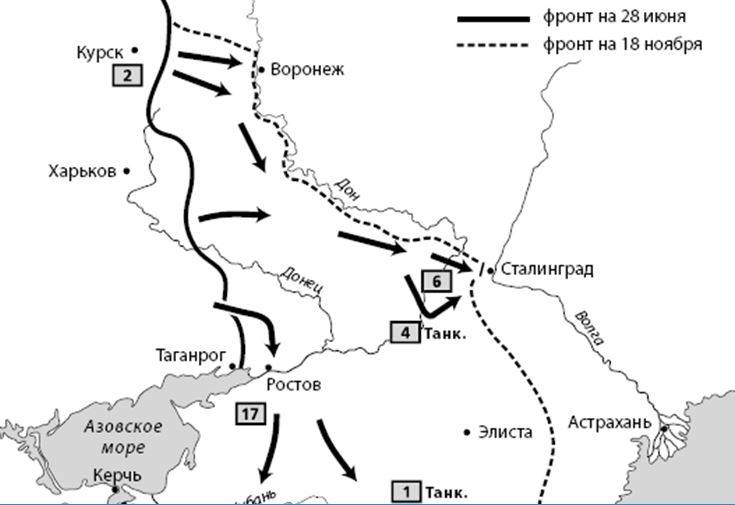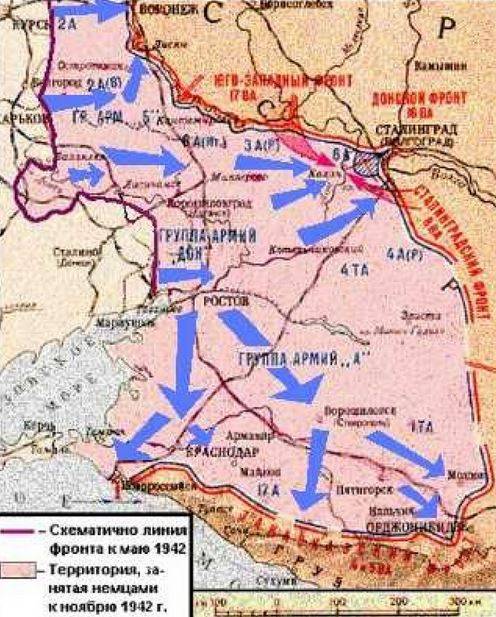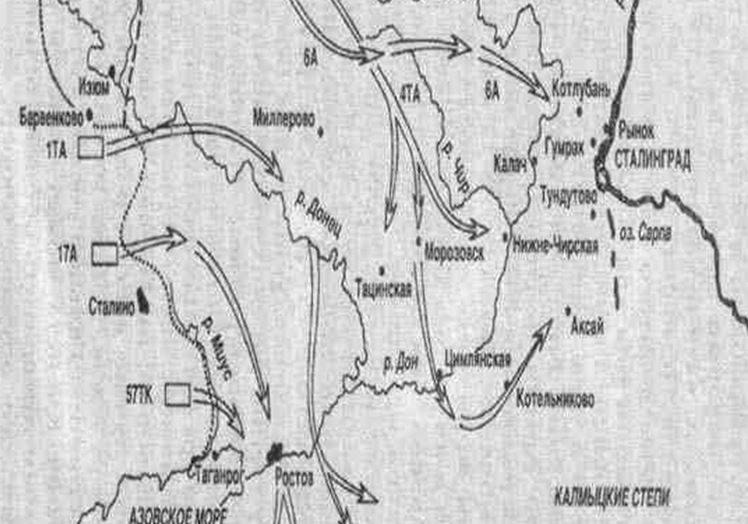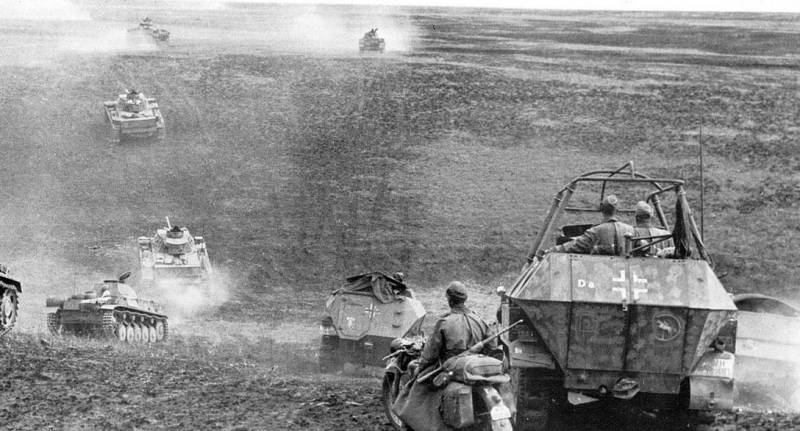Why in the summer of 1942 did we roll back to Stalingrad so quickly?
The 1942 military campaign of the year for the Soviet command turned out to be no less catastrophic than the setbacks in 1941. After a successful Soviet counter-offensive in the winter of 1941/42 near Moscow, German troops were driven back to the Rzhev area, but the threat to Moscow still remained. Attempts of the Soviet offensive in other sectors of the front had partial success and did not lead to the defeat of the German armies.
Spring failure of Soviet counterattacks
In order to weaken the efforts and divert the funds of the Germans during a possible offensive against Moscow in the spring of 1942, three offensive operations were planned: on the Kerch Peninsula in the Crimea, near Kharkov and near Leningrad. All of them ended in complete failure and defeat of the Soviet armies. Operations in the Crimea and near Kharkov were tied in time and were supposed to weaken the forces of the Germans on the South-Western and Southern Fronts and contribute to the release of Sevastopol.
The operation near Kharkov was being prepared on the initiative of front commander Timoshenko, and the Germans knew about its preparation. The German command, in turn, planned Operation Blau to seize the oil fields of the Caucasus and the Caspian Sea, and in support of this operation set the task of eliminating the Soviet Barvenkovsky ledge with converging strikes from Slavyansk and Balakleya (Operation Fridericus). From this ledge, Timoshenko planned to take Kharkov in ticks and seize it. As a result, in March-April 1942, a race was underway in the Kharkov region to prepare offensive operations directed against each other.
Tymoshenko launched the offensive first on May 12, but the 1st tank Kleist's army struck a cleaving blow on May 17, and by May 23 the entire Soviet group was in the "Barvenkovo cauldron."
Irrecoverable losses of the Soviet army amounted to about 300 thousand people, there were also serious losses in weapons - 5060 guns and mortars and 775 tanks. According to German data, 229 thousand people were taken prisoner, only 27 thousand people were able to get out of the encirclement.
In the Crimea, the Germans, on the contrary, were the first to go over to the offensive on May 8, which was a complete surprise for the front command, and the Soviet troops were defeated within a week and pressed against Kerch, which fell on May 15. The remnants of Soviet troops ceased resistance by May 18. The total losses of Soviet troops on the Kerch Peninsula amounted to about 180 thousand people killed and captured, as well as 1133 guns and 258 tanks. About 120 thousand servicemen were evacuated to the Taman Peninsula.
After the defeat on the Kerch Peninsula, the fate of Sevastopol was a foregone conclusion, and after 250 days of heroic defense, it fell on July 2. As a result of the evacuation of only the senior command staff, according to archival data, 79 thousand soldiers were thrown in Sevastopol, many of whom were captured.
Unsuccessful Soviet operations in the south led to the loss of more than half a million personnel, a significant number of heavy equipment and a serious weakening of the Southwestern and Southern fronts, which made it easier for the German command to carry out the pre-planned Blau operation for a strategic offensive on the oil fields of the Caucasus and created the preconditions for the exit to Stalingrad and the Volga.
Near Leningrad, the Lyuban operation to unblock the city, which began in January, also ended in failure, the 2nd Shock Army under the command of General Vlasov fell into the "boiler". Attempts to escape were unsuccessful, and on June 24 it ceased to exist, irrecoverable losses amounted to more than 40 thousand fighters.
Miscalculations of the Soviet command
The Soviet command believed that the German offensive in 1942 would be on Moscow, and concentrated the main forces in this direction. In addition, the Germans successfully carried out Operation Kremlin on misinformation about the preparation of an offensive on Moscow and a false transfer of their reserves to this direction. The German groupings were seriously reinforced with fresh motorized and tank divisions, new 75mm anti-tank guns, and T-3 and T-4 tanks with long-barreled guns.
No conclusions were drawn from the information obtained in a German plane shot down on June 19 over Soviet positions, in which there was a German staff officer with documents on one of the stages of Operation Blau. The Soviet command assumed that the offensive on Voronezh was preparation for an offensive on Moscow, since from Voronezh it was possible to advance north in the direction of Moscow and south in the direction of Rostov and Stalingrad.

Hitler made the decision to attack not Moscow, but rushed to the south and the Caucasus, and this had its own logic. The German army did not have enough fuel and needed Caucasian oil, since Germany's own oil reserves were practically depleted, and its ally Romania did not have enough of it to supply the multimillion-strong German army.
Operation Blau
Operation Blau was multi-stage and envisaged an offensive in a wide sector of the front from Taganrog through Rostov and Kharkov to Kursk. Provided for the defeat and destruction of the Soviet armies of three fronts: Bryansk, Southwestern and Southern. The delay of the German troops in the Crimea and near Kharkov only shifted the start of the operation by several weeks.
To solve the tasks of the operation, two army groups were formed: the southern army group "A" under the command of General Field Marshal List, which included the 17th field and 1st tank armies, and the northern army group "B" under the command of General Field Marshal von Boca as part of the 4th tank, 2nd and 6th field armies. The operation also involved the 8th Italian, 4th Romanian and 2nd Hungarian armies.
Powerful tank wedges were supposed to break through and liquidate the Bryansk front, encircling and destroying enemy forces, then capturing Voronezh and turning all mobile forces south along the right bank of the Don River to the rear of the troops of the Southwestern and Southern Fronts in order to encircle the Soviet troops in a large bend of the Don with further development of success in the direction of Stalingrad and the Caucasus, covering the left flank of German troops along the Don River. The capture of the city was not envisaged: it was necessary to approach it at a distance of effective artillery fire in order to exclude it as a transport hub and center for the production of ammunition and weapons. At the final stage, the capture of Rostov-on-Don and the advancement of mobile connections to the oil fields of Maikop, Grozny and Baku.
Hitler also signed on July 1 Directive No. 43, which ordered the seizure of Anapa and Novorossiysk by amphibious assault and further along the Black Sea coast to reach Tuapse, and along the northern slopes of the Caucasus Mountains to the Maikop oil fields.
The beginning of the German offensive
The German offensive began on June 28, the 4th Panzer and 2nd German armies entered the operational space from the Kursk region. They broke through the front, and at the junction of the Bryansk and Southwestern fronts, a gap formed about 200 km along the front and 150 km in depth, through which German tanks occupied the entire Kursk region and rushed to Voronezh.
The Soviet command took this as the beginning of an offensive on Moscow through Voronezh and sent two tank corps to meet. Between Kursk and Voronezh near the Gorodishche, Soviet tank formations were met with powerful anti-tank artillery fire, and were attacked from the flanks and rear by German tanks. After this battle, the tank corps ceased to exist, and the road to Voronezh was opened.
The 30th Army of Paulus went on the offensive on June 6, south of Voronezh, which was supported on the left flank by the 2nd Hungarian Army, and on the right flank by the 1st Panzer Army. Paulus's army quickly reached Ostrogozhsk and threatened the rear of the Southwestern and Southern fronts.
By July 3, German tankers broke into Voronezh, seized the Don crossings and crossed it. By July 6, the right bank of Voronezh was captured by the Germans, and stubborn battles for the city began. The Germans failed to capture the entire city. Hitler decided that the 2nd Army would take him anyway, and on July 9 he sent 4th Panzer Army south to encircle the Soviet armies in the Don bend. The forces to capture Voronezh were not enough, and the 2nd Army and part of the 2nd Hungarian Army were shackled for a long time in the Voronezh region and could not move south.
In early July, a gap of several tens of kilometers formed between the flanks of the Southwestern and Southern fronts, which there was no one to close. The German command threw mobile units here and made efforts to encircle and destroy the main forces of the South-Western Front, preventing them from retreating to the east. For these purposes, from the north from Voronezh, Army Group B was advancing with the forces of the 4th Panzer and 6th Armies, and from the south from the Slavyansk region, Army Group A was advancing by the forces of the 1st Panzer Army with a general direction to Millerovo.

The headquarters ordered on July 6 to withdraw the troops of the Southwestern Front and gain a foothold on the Novaya Kalitva - Chuprinin line, but the front's troops were unable to avoid being hit by tank wedges. The troops that went over to the defensive on the southern bank of the Black Kalitva River could not withstand the blow and were simply swept away. The defense of the Southwestern Front collapsed, and the German troops, meeting no resistance, marched eastward across the steppe.
In connection with the complication of the situation on July 7, the Voronezh Front was created and strengthened, the troops of the South-Western Front received permission to retreat from the Donets to the Don in order to avoid encirclement. From the remnants of the Southwestern Front on July 12, the Stalingrad Front was created and reinforced by three reserve armies - the 62nd, 63rd and 64th, and Stalingrad was transferred to martial law. If the Germans had crossed the Volga, the country would have been cut, would have lost the Caucasian oil, and a threat would have hung over Lend-Lease supplies through Persia.
In order to end the panic at the front, on July 8, Stalin issued the well-known Order No. 227 entitled "Not a Step Back." For each army, special detachments were created to exclude retreat without an order.
"Boiler" near Millerovo
Tankers of Paulus's army crossed the Chornaya Kalitva River on July 7 and reached the Kantemirovka area by the end of July 11, and the advanced formations of the 4th Panzer Army, moving along the Don, entered the Rossosh area. Near the Vodyanoy farm, groupings of armies A and B moving towards each other merged, closing on July 15 the encirclement ring in the Millerovo area around the three armies of the Southwestern Front. The distance between the outer and inner rings was insignificant, and this allowed part of the troops to break out of the encirclement without heavy weapons.
The encirclement turned out to be about 40 thousand, and the front lost almost all the heavy weapons that it managed to withdraw from Kharkov. The Soviet front in the southern direction actually collapsed, and there was a real threat of the Germans breaking through to Stalingrad, the Volga and the Caucasian oil. For the defeat in the bend of the Don, Stalin dismissed Timoshenko, and General Gordov was appointed commander of the Stalingrad front. In this catastrophic situation, the Stavka ordered the commander of the Southern Front, Malinovsky, to withdraw the troops beyond the Don in its lower reaches.
Throw south to Rostov-on-Don
After success at Voronezh and in the bend of the Don, Hitler decides to encircle and destroy the forces of the Southern Front in the lower reaches of the Don, for which he orders the 4th Panzer Army and the 40th Panzer Corps to stop the advance on Stalingrad and move south to join the 1st Panzer army advancing on Rostov-on-Don, and Paulus's 6th Army was to continue the offensive to the Volga. The Germans increased the pace of the offensive, without encountering serious resistance in the steppe area, individual strongholds, pillboxes and tanks dug into the ground quickly bypassed and then destroyed, the remnants of scattered Soviet units withdrew to the east.

By July 18, 40th Panzer Corps, having covered at least two hundred kilometers in three days, reached the lower reaches of the Don and captured the important railway junction Morozovsk. Over the gates of the Caucasus - Rostov-on-Don, the threat of a fall loomed: the 17th army was advancing from the south, the 1st tank army from the north, and the 4th tank army was preparing to cross the Don and enter the city from the east. Tank formations reached the bridges across the Don on 23 July, and on that day the city fell.
Hike to the Caucasus and a breakthrough to the Volga
With the fall of Rostov-on-Don, Hitler considered that the Red Army was on the verge of final defeat and issued Directive No. 45, which posed more ambitious tasks for the army. So, the 6th Army was supposed to capture Stalingrad, and after taking it, send all motorized units to the south and develop an offensive along the Volga to Astrakhan and further, up to the Caspian Sea. The 1st and 4th Panzer Armies were to move to the oil fields of Maikop and Grozny, and the 17th Army was to occupy the eastern coast of the Black Sea and capture Batumi.
At the same time, Manstein's 11th Army, which captured the Crimea, was sent to the Leningrad region, and the SS Panzer Divisions "Leibstandart" and "Great Germany" were sent to France. Instead of the departed formations on the flanks of the Stalingrad Front, the Hungarian, Italian and Romanian armies were introduced.
Stalingrad was to be attacked by Paulus's 6th Army from the Don bend and one of the tank corps of the 4th Panzer Army, which Hitler deployed and sent back north to speed up the operation to capture the city.
At dawn on August 21, infantry units in the Don bend crossed the river on assault boats, captured a bridgehead on the eastern bank, built pontoon bridges, and a day later the 16th Panzer Division moved along them to Stalingrad, which was only 65 km away. By the end of the day on August 23, the forward tank battalion, on the way of which there were only heroically dead female anti-aircraft gunners, having overcome the distance from the Don to the Volga in one day, reached the right bank of the Volga north of Stalingrad, cutting off all communications. Subsequently, to supply the besieged Stalingrad, it was necessary to build a rockade railway along the left bank of the Volga. At the same time, German soldiers of one of the mountain rifle units hoisted the Nazi banner on Elbrus, the highest peak of the Caucasus.
On a sunny and cloudless Sunday, August 23, according to vacationers of Stalingrad, German aviation inflicted the most massive raid on the Eastern Front with carpet bombing of the city. It was turned into a real hell and almost completely destroyed, out of 600 thousand civilians and refugees, about 40 thousand people died. From this moment began the heroic defense of the besieged Stalingrad for many months, which ended in the disaster of the Germans on the Volga.
German troops were at the limit of their strength and capabilities, as they faced strong and unexpected resistance from Soviet troops, who did not flee in panic in front of a superior enemy, but fought to death, holding him back. Hitler demanded to attack the Caucasus and the Caspian Sea, for which the German army already had no strength. The communications over hundreds of kilometers, and the organizational and ideological weakness of the Romanian, Italian and Hungarian troops covering the German rear and flanks, well known to the German and Soviet commanders, made an adventurous operation to seize Stalingrad and the Caucasus.
The Red Army, having clashed on a number of sectors of the front with the Italian, Romanian and Hungarian allies of the Germans, threw them back and seized a number of bridgeheads that played a decisive role in the Soviet counteroffensive. The high command of the Red Army was gradually recovering from the shock of the catastrophic defeats of the spring and summer of 1942 and was preparing to inflict a crushing blow on the Germans at Stalingrad.
- Yuri Apukhtin
- bravo-voronezh.ru vrnplus.ru yandex.ru

Information